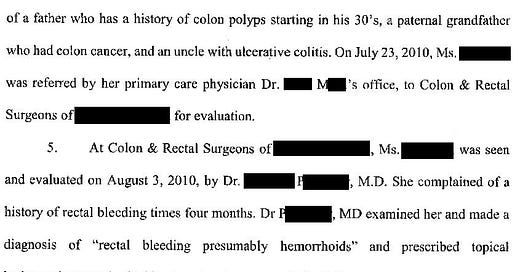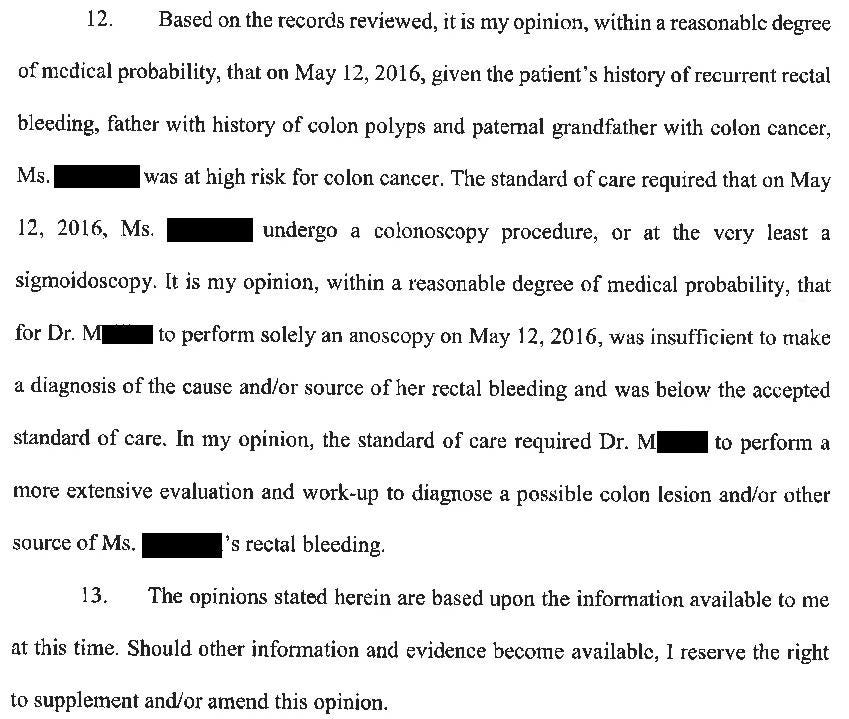A 27-year-old woman was seen in 2010 by a colorectal surgeon for rectal bleeding for 4 months.
She was diagnosed with hemorrhoids.
In 2016, she returned with rectal bleeding again.
Anoscopy was done and identified a hemorrhoid.
Dr. M recommended conservative treatment.
She continued to bleed intermittently.
2 years later she came back and saw the same surgeon.
Repeat anoscopy did not reveal any hemorrhoids, so a colonoscopy was scheduled.
A large mass was identified and biopsied.
She was diagnosed with rectal adenocarcinoma, metastatic to the liver.
Join thousands of doctors and attorneys on the email list.
The patient sued the colorectal surgeon and his practice for allegedly missing the cancer in 2016.
An expert witness was hired:
The two sides reached a confidential settlement prior to trial.
Become a medicolegal expert and improve your practice of medicine.
Paying subscribers get a new case every week and access to the entire archive.
MedMalReviewer Analysis:
The inaccurate family history documented at the 2016 visit was one of the key criticisms of the surgeon. He recorded that she did not have a family history of colon cancer or inflammatory bowel disease, when in fact she had family members with both of these diagnoses. It seems unlikely that the patient erroneously denied a family history of colon disease given she specifically endorsed a positive family history at the 2010 visit.
The surgeon identified an explanation (a hemorrhoid) for her rectal bleeding and assumed it was the only cause. This is a safe assumption to make in the overwhelming majority of cases. Continuing to search for additional causes of a patient’s symptoms after a plausible cause has been identified can result in unnecessary workups and escalate to the level of paranoia if left unchecked. But in this case it may have saved a life.
The patient survived for several years but passed away at the age of 38 in 2021. A drastically shortened life from a delayed cancer diagnosis usually leads to a large settlement. I wouldn’t be surprised if this settle close to policy limits.
There’s been a significant increase in young-onset colorectal cancer over the past few decades. Having a close relative with colorectal cancer increases the odds, especially in young patients. Keep this in mind when seeing young patients with rectal bleeding. This article is a good systematic review of the topic: https://www.ncbi.nlm.nih.gov/pmc/articles/PMC8371519/
Editor’s note: Several GI physicians pointed out that having a second-degree relative (grandparent) with colorectal cancer conveys far less risk than a parent.







As a gastroenterologist practicing for many years, I do not agree with all points made by the Medmal reviewer or the expert surgeon. First of all, the "family history" of a grandparent with CRC (colorectal ca) is irrelevant in terms of risk, and therefore such a family history is not included as a risk in any of our practice guidelines, including from the ACG, AGA, etc. The FH of the father may.... be relevant, but especially if this tumor found was related to Lynch syndrome. The overwhelming issue with this case, which the surgeon reviewer didn't point out, was that anyone, even a young person, with ongoing bleeding (as opposed to very sporadic bleeding) usually does not have hemorrhoids as the diagnosis. Hemorrhoids bleed only intermittently in the vast majority of cases; and even though CRC was a less likely diagnosis in this pt due to her age, we often find some other cause of chronic bleeding, like a Juvenile polyp, or ulcerative colitis or proctitis, in such a patient. Thus, I agree with the assessment that there was a breach, just not fully with the reasoning noted.
I (a gastroenterologist) doubt that a bleeding polyp in May 2016 would take 2 years and 3 months to become malignant. The bleeding in 2016 likely was the hemorrhoid and nothing more. That being said, this patient should definitely have had a colonoscopy just for having that many bleeding episodes overall. So below the standard of care? Yes. The source of injury to the patient? I very much doubt it.